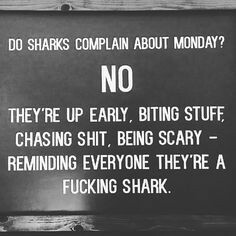Text
Budgeting Interview
1. Why do you need a budget?
So I know how much money the unit has, and I can plan activities accordingly. We usually have an annual budget of about $125k for travel, and $15k for other general stuff. You can’t just sling that amount of money around willy nilly. You need to have a plan. It seems like a lot but it will run out fast.
2. What does your budget include?
Travel budget and a budget to purchase things I need, like a $4,000 coffee maker. Not a joke. Things to improve unit morale and functioning, refresh office supplies and equipment.
3. What things do you consider first when planning your budget?
How much money total I have available. Then what I need to accomplish. I try to match up what’s available with what I need to spend, but there are always little surprises that crop up along the way.
4. How do you handle surprise costs that weren’t budgeted in?
Prioritize based on the most pressing needs. If a renovation ended up costing 10% more than we thought it would and budgeted for, then we have to take that 10% out of somewhere else. There might not be as much morale stuff as we would have liked. Something we like to do is have a yearly BBQ and morale day for members and family. If we blow our budget, we can’t do cool things like that. Unfortunately, the fun stuff gets axed first.
5. What are your ultimate goals with your budget?
In my dream budget, we’d have enough money to meet those goals and accomplish the mission. Leftovers are nice I guess but they’re not the best, because that means you didn’t plan right. You didn’t know exactly what you needed. In this situation, surplus is bad. The government gives us as much money as we spent last year. So for FY17, they’ll only give us as much as we spent in FY16. That means if we start with $150k, we better spend $150k. It’s usually not a problem.
6. What software or programs are your favorite for budgeting and why?
I use Excel because it’s easy to use and I can create my own formulas. I can tailor it to exactly what I need. There are other premade ones out there, like YNAB and Mint, but those aren’t robust enough for what I need, and they don’t do exactly what I want. Setting up Excel takes a little longer but it’s awesome once it gets going.
7. What’s the hardest thing about budgeting?
There’s never enough money. Everyone wants something and not everything can be paid for. You have to make tough choices.
8. What’s the most satisfying thing about budgeting?
Accomplishing goals and being able to pay for everything you needed to. When you budget for $150k and you spend exactly $150k, it feel really good. It means you’ve got your finger on the pulse of what’s going on. It means you’re really connected to the unit.
9. What advice would you give a new manager in regards to creating and maintaining a budget?
To just do it. Establish a good system that works for you. Track it. Follow up on it. Improve it. You have to be actively involved in your budget or it will eat you alive.
10. What’s something you wish you had known about budgeting when you started doing it?
It’s not as hard as some people make it seem. People talk it up like it’s this big, scary, difficult thing, but it isn’t. You just have to pay attention to what’s going on, and you’ll be fine. Don’t be scared of it.
0 notes
Text
Firing/Discipline Interview
1. What does discipline look like in your workplace?
We have letters of counseling and letters of reprimand, which go in your personnel file for the rest of your career. They can be the thing that prevents you from getting a promotion or job opportunity in the future, so most people try to avoid them.
2. Why do you discipline someone?
When I think they’re not even trying anymore, or when they have a negative attitude about improvement. Someone who brings everyone else down. We need to work as a tea, and someone who can’t manage that doesn’t need to be here.
3. When do you discipline someone?
It depends. If it seems immediately fixable, I’ll do it right then. I take them aside privately and talk to them about the issue. If it’s something that would take longer to fix, I still take them aside, but instead of trying to fix it just then, we try to go over plans for improvement.
4. What would someone have to do to get fired?
This is the military, so you have to do pretty serious stuff to get just straight up fired. You’d probably end up in jail or with an Article or something like that. More often what happens is we don’t approve someone to reenlist. Usually they don’t want to if they’ve been doing a poor job, so that doesn’t come up much.
5. What kinds of things keep you from reenlisting people?
Not meeting military standards, not doing training, having those negative papers in their personnel file, and having unfavorable yearly evals.
6. What’s the best way to discipline someone?
Directly and honestly, without accusing or yelling. People don’t respond well to that, generally. This isn’t the Marine Corps. Airmen don’t get off on being yelled at. I like to get their take on the situation or issue, and let them tell me what’s going on. I’m not going to harp on someone about their poor attitude if, say, a close family member is having health problems, or they have financial issues. I’ll work with them on managing those problems, which will hopefully lead to improvement at work.
0 notes
Text
Performance Appraisal
1. How many people do you supervise?
Directly, one. Indirectly, fourteen.
2. Do you do all of those evals yourself?
I only directly do my direct supervisee’s performance eval. Then he does the performance eval of his three subordinates, and they do the evals of their subordinates, and so on. I read all of them but I don’t perform them.
3. How do you keep up with performance appraisals for everyone?
I put a program in place where every month each supervisor sits down with their supervisee(s) and goes over what they did that month, and their goals for the next month. Then they can better track goals and growth, or see where problems are occurring. It’s easier to fix a problem if you do monthly evals than if you only do them yearly.
4. Is this helpful?
Definitely. When it comes to the official yearly eval, we have twelve little ones we can pull information from. It makes the yearly evals go way faster and smoother.
5. What’s your way of dealing with bad results?
Verbal counseling. I ask what the issue is, why the problem happened in the first place, and try to put a plan in place to solve it. Mentors are good, too. As long as the person is trying to improve, I don’t punish.
6. When DO you punish?
When the person is obviously not trying and has a bad attitude about things.
7. So when a person has a good attitude, you don’t punish them?
Punishment is something I don’t like to do. I like to figure out how to help people achieve the goals they want to get, and that I want as well. Punishment doesn’t do much. It’s mostly a deterrent.
8. What do you do to punish?
Paperwork for permanent files. It affects future promotion, or when reenlistment comes around, if they have too many negative forms in their file, they won’t be reenlisted. It can be a slow process but I don’t have to do it often.
9. When do you step in as a manager for your indirect subordinates?
When their supervisors ask me to, or if I notice a problem. I try to let my subordinates handle their own business, because if I step in for every little problem, they’re never going to learn how to manage on their own.
10. What’s the most important piece of advice you would give a new manager?
Keep paper trails, and talk to your people face-to-face often. Face time will get you better results than just email communication. They will see you as a real person and not just “the boss”.
0 notes
Text
Hiring Interview
1. What’s the most important thing you look for in a new hire?
Confidence, experience, and the ability to work well as a team. Also the initiative to do what they know needs to be done without being told.
2. What kind of hiring process do you do?
A board of three interviewers will sit down with each interviewee and ask a series of questions. Each interviewer rates the interviewee on their questions, and then the total score is added up at the end.
3. Do you let current employees comment on new hires?
Not usually. If a current employee has referred someone, we consider the referral, but it doesn’t hold a lot of weight.
4. What do you expect from interviewees?
I expect them to be informed about the job and motivated to bring their best to this unit.
5. Is physical appearance important?
Yes. This is a professional environment and everyone is held to the same standards of dress and appearance.
6. What are red flags for you?
Someone who isn’t able to answer my questions. Someone who is clearly unprepared.
7. Are references or referrals important?
Somewhat, but I like to get to know the individual, not what their friends think of them.
8. Can you tell when someone is prepared versus when they’re not?
Yes. It’s obvious who has put in the effort for preparing for the interview. I can also tell who has memorized answers and who is naturally a better speaker.
9. Do you think it’s a negative if the interviewee has obviously memorized answers?
Not necessarily. Interviews are stressful and sometimes people rehearse and memorize so they don’t stammer over their words. I’d rather have someone who clearly rehearsed, than someone who didn’t prepare at all.
10. What’s the worst interview panel you were ever part of?
The guy had clearly lied on his resume. We read those things, you know. I asked him a question from the resume and he had no idea what I was talking about. Be honest!
0 notes
Text
Code of Ethics for Nurses
Provision 1: The nurse practices with compassion and respect for the inherent dignity, worth, and unique attributes of every person.
Provision 2: The nurse’s primary commitment is to the patient, whether an individual, family, group, community, or population.
Provision 3: The nurse promotes, advocates for, and protects the rights, health, and safety of the patient.
Provision 4: The nurse has authority, accountability, and responsibility for nursing practice; makes decisions; and takes action consistent with the obligation to promote health and to provide optimal care.
Provision 5: The nurse owes the same duties to self as to others, including the responsibility to promote health and safety, preserve wholeness of character and integrity, maintain competence, and continue personal and professional growth.
Provision 6: The nurse, through individual and collective effort, establishes, maintains, and improves the ethical environment of the work setting and conditions of employment that are conducive to safe, quality health care.
Provision 7: The nurse, in all roles and settings, advances the profession through research and scholarly inquiry, professional standards development, and the generation of both nursing a health policy.
Provision 8: The nurse collaborates with other health professionals and the public to protect human rights, promote health diplomacy, and reduce health disparities.
Provision 9: The profession of nursing, collectively through its professional organizations, must articulate nursing values, maintain the integrity of the profession, and integrate principles of social justice into nursing and health policy.
http://nursingworld.org/DocumentVault/Ethics-1/Code-of-Ethics-for-Nurses.html
0 notes
Text
10 Interview Questions
1. “Tell me about yourself.” My class spoke at length last time about how this isn’t a good question because it’s not specific enough. But for me as an interviewer, this question in perfect. I want to hire people who are intelligent, can think on their feet, and understand how to take advantage of presented opportunities. This question is an opportunity for the interviewee to tell me what about them makes them a good fit for the job. All else being equal, if I had one candidate who answered this question by specifically detailing good ICU nurse qualities (passionate about patient care, active member of the community, dedicated to improvement and learning) versus someone who talked about how they love their dog, imma go with #1 every time. Cool, dogs are great, but that has nothing to do with this job.
2. “If you were an animal/kitchen appliance/pair of shoes/etc, what kind would you be?” This is another think-on-your-feet question. It seems absurd at first, but what it really does is present the interviewee with yet another opportunity to showcase what’s special about them. I was legitimately asked in an interview what kind of animal I was. I answered koala, because I appear cuddly and sleepy on the outside, but I’m capable of taking out the claws and making people sorry that they messed with me (also, my greatest natural predator is the dingo). As an interviewer, I want to see someone be able to process something unexpected, and be able to give some semblance of a coherent answer.
3. “Why do you want to work for this company?” Is this just throwing spaghetti at a wall and seeing if it sticks? Or do you know my company’s values and goals, and are you going to be the kind of employee who helps us achieve those? Do you even know what my company’s values and goals are? Every company’s webpage has these things listed, and it takes about 5 minutes on Google to find them. I want to hire someone who has put in at least some effort into knowing something about my company.
4. “Why did you leave your last job?” I talked in #3 about how I’d want an employee who is capable of research, and honey, I expect the same thing out of me. You bet your sweet butt I’m calling those ex-bosses and asking them why you left and how you performed. You can talk yourself up all you want, but the real proof is in the proverbial pudding.
5. “Where do you see yourself in 5 years?” If it’s no longer with this company, that’s seriously fine. This isn’t the 50s. People don’t stay with one company and sit at one desk for their entire professional lives anymore. I want to hear about things like planned educational goals, advancing to management, taking on responsibility. If I get an answer like “well, I haven’t thought of it,” I’m going to hear alarm bells. As a manager, I want to help my employees succeed and grow, but I can’t do that if you don’t even know where you want to grow to.
6. “What kind of team member are you?” Throwing a bone. This is your opportunity to talk yourself up in a critical area of nursing: teamwork. Come on. Shine, baby.
7. “Who is someone you look up to, and why?” Gonna be super honest, if you say “I look up to my grandma because she grows great radishes,” you’re going to get a high five. This kind of question tells me about things you value and things you’re willing to work for. If you look up to the Dalai Lama because you’re awed by his amazing resolve in the face of unspeakable injustice (as we all should be), then I know you’re going to be chill and be willing to fight against what you perceive to be injustice (read: advocating for patients). Heck, even if you say you look up to Kim Kardashian because she’s a B-rated porn star who now runs a huge business empire, that’s going to tell me that you’ve got in your mind a motivation to turn a humiliation into something great (read: learning from mistakes).
8. “What was the last book you read for fun?” Reading is for winners, kids. Do it. Bonus points if it’s Stephen King or Neil Gaiman.
9. “What makes you uncomfortable? If this were to happen at work, what would you do?” Everyone gets uncomfortable, but nurses are born in it. If penises make you uncomfortable and your confused male patient pulls his Foley out, you cannot let your discomfort affect your patient care. If it does, then I probably don’t want you to work for me.
10. “Do you have any questions for me?” I get it. Interviews are stressful and scary. But so is nursing. I need you to be cognizant of things going on around you, even when you’re stressed. Codes are stressful, but you still need to be able to function. I have all kinds of ridiculous knick-knacks on any desk I sit at, and I’d be thrilled if a prospective employee pointed to my BB-8 miniature and said something like, “Here’s a question: do you think Rey is a Skywalker? Because I think she’s a Kenobi.” Instant hire. Welcome to the ICU.
0 notes
Text
5 Behavioral Based Interview Questions
I wrote these with the assumption that this is the interviewee’s first job as a nurse, but not a first job period.
As far as I understand it, behavioral based questions are things that enable the interviewer to gauge a person’s personality via examples of past behaviors. So that’s my thought process going into writing these.
1. Tell me about a time you failed, and how it has affected your future actions.
2. Describe a time you witnessed injustice, and what you did (or wished you had done) to correct it.
3. Tell me about a time you served your community.
4. Tell me about a time you got into a disagreement with someone, and you realized you were wrong.
5. Describe a time you identified a problem or deficit, and what steps you took to fix it.
0 notes
Text
Homework
10-15 interview questions.
5 behavioral-based questions.
Do an interview. Ask someone about hiring.
0 notes
Text
Most Frequently Asked Interview Questions
1. “Tell me about yourself.”
2. “Why should I hire you?”
3. “Tell me about one of your weaknesses.”
4. “Tell me about one of your strengths.”
5. “Tell me about a conflict you’ve had at work and how you resolved it.”
6. “Where do you see yourself in five years?”
7. “Why are you leaving your current job?”
8. “What’s a time you exercised leadership?”
Homework: come up with some interview questions, and what answers you’re looking for.
0 notes
Text
15 Reasons to Ask a Question
1. Acquire knowledge.
2. Eliminate confusion.
3. Cause someone else to feel special/important.
4. Guide a conversation.
5. Demonstrate humility to another.
6. Enable a person to discover answers for themselves.
7. Gain empathy through better understanding of a person’s views.
8. Influence/alter another’s opinions or views.
9. Begin a relationship.
10. Strengthen a relationship.
11. Stimulate creativity and idea generation.
12. Get attention.
13. Solve a problem.
14. Reach an agreement.
15. Agree to disagree.
Reasons NOT to Ask a Question
1. Find a culprit.
2. Embarrass.
3. Shame.
4. Play the victim.
5. Etc.
0 notes
Text
Characteristics of Leadership
1. Leadership requires personal mastery – Nurses demonstrate leadership when they show competence and mastery in the tasks they perform. Nurses are deemed competent by means of a license to practice nursing (NLN 2010).
2. Leadership is about values – Nurses demonstrate leadership when they are true to their values and use them for the betterment of patients an coworkers.
3. Leadership is about service – Nurses demonstrate leadership when they use their skills to give back to the community.
4. Leadership is about people and relationships – Nurses demonstrate leadership by developing and maintaining relationships with patients, family, and other hospital staff.
5. Leadership is contextual – Nurses demonstrate leadership by acknowledging that they are not experts in all areas, and deferring to those who are experts at a given task.
6. Leadership is about the management of meaning – Nurses demonstrate leadership
7. Leadership is about balance – Nurses demonstrate leadership by maintaining a professional life and a personal life.
8. Leadership is about continuous learning and improvement – Nurses demonstrate leadership by doing CE activities and promoting them within the unit.
9. Leadership is about effective decision making – Nurses demonstrate leadership by being decisive.
10. Leadership is a political process – Nurses demonstrate leadership by being involved in nursing organizations, from a hospital committee to national nursing politics.
11. Leadership is about modeling – Nurses demonstrate leadership by leading by example, and showing other nurses the right way to do things, rather than telling them the right way.
12. Leadership is about integrity - Nurses demonstrate leadership by being honest in all areas: medication errors, procedure mistakes, and following through on promises.
0 notes
Photo
Dirtbag brain.

263K notes
·
View notes
Photo
The struggle is real.

435K notes
·
View notes
Text
Leadership/Management Theories
Classical: https://www.villanovau.com/resources/leadership/classical-management-theory/
Contingency: http://www.leadership-central.com/fiedler's-contingency-theory.html
0 notes
Text
DISC Personality Test
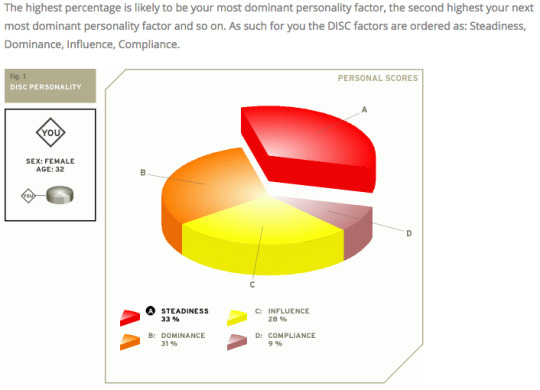
Here’s the breakdown: Steadiness first, then Dominance, then Influence, and lastly Compliance. Which makes sense, since my first response to nearly everything is:

I’m going to compare these results to my MBTI type, which is E/INFJ. I scored equally in Extroverted and Introverted, so I get to claim both. HA!
INFJ is “the Counselor,” and is characterized by introspection, cooperation, direction, and attention.
ENFJ is “the Teacher,” and is characterized by introspection, cooperation, direction, and expression.
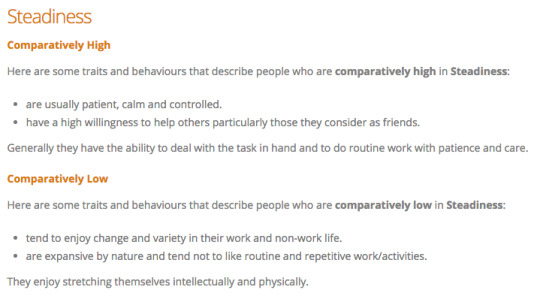
Steadiness is my highest factor, so let’s start here. I can be patient and calm most of the time, but I tend to lose it when I’m faced with what I consider to be injustice or bullsh*t. I do have a high willingness to help others. Obviously I prefer my friends, but I also know that no matter how I feel personally about someone, if they’re part of my “group,” it’s in everyone’s best interests if that person is also improved. An organization is only as strong as its weakest member.
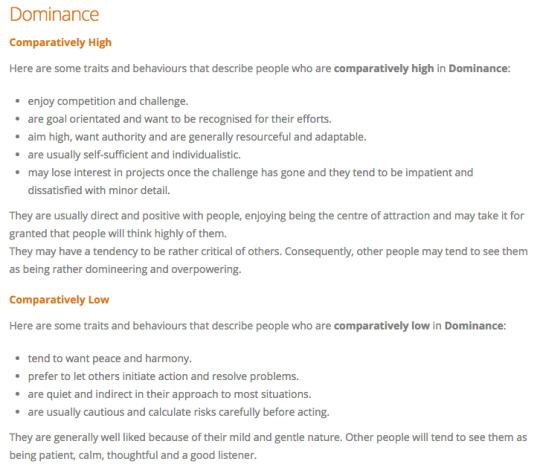
Dominance is my #2 trait. This is more in line with the Teacher, which runs the risk of steamrolling people with their ideas and enthusiasm.

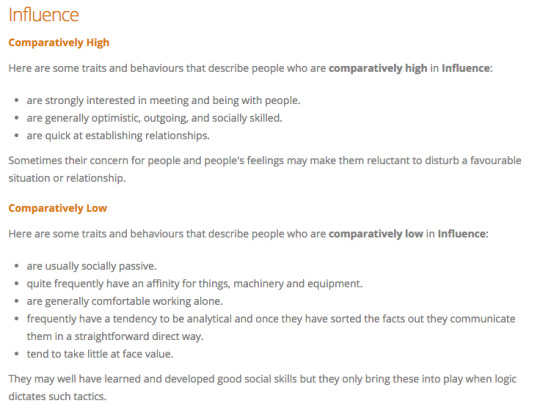
Like Dominance, Influence is also a little more Teacher-leaning. One of the biggest differences between Counselors and Teachers is their level of comfort being outgoing with others. I’m not particularly a fan of people, but I can interact with them when I need to. Something Teachers and Counselors both do is assume the mannerisms of whoever they’re interacting with at the moment, making them social chameleons. They’re both private and hard to get to know, which lends mystery to them, but they’re both very friendly, so they’re not viewed as cold or standoffish.
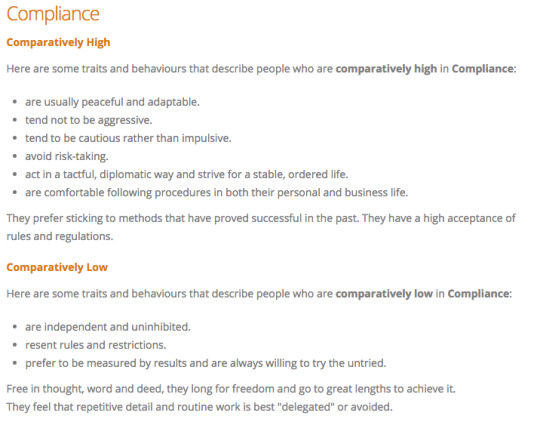
Compliance is my lowest trait. DON’T TELL ME WHAT TO DO! Ask me. Nicely. The part there about preferring to be measured by results is spot on. I hate resumes or self-evaluations, because I’d rather just slide a bunch of finished projects across the table and let them speak for themselves.
0 notes
